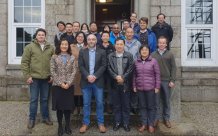articles

Group photo at University of Exeter and GIEC research meeting. Professor Lars Johanning second form left, front row. (Photo taken prior to lockdown and social distancing)
Renewable Energy expert to pioneer new station-keeping systems for marine renewable energy devices (MRE).
A leading Renewable Energy expert from the University of Exeter has received a prestigious visiting scientist funding, to develop new station-keeping systems for marine renewable energy devices (MRE).
Professor Lars Johanning, based at the Penryn Campus in Cornwall, has been awarded a CAS President’s International Fellowship Initiative, PIFI, funding award for his collaborative work with the Guangzhu Institute of Energy Conversion (GIEC) for the innovative Sharp Eagle Device
The project is seeking to reduce performance and reliability uncertainties of permanent mooring systems for the floating marine renewable energy converter, Sharp Eagle device, through the development of innovative mooring systems.
The project will use integrated methodologies the dynamic behaviour of mooring systems, including the classification of fluid-structure interactions and their effect on line loading.
It will also investigate the behaviour of load bearing components subjected to highly dynamic loading regimes, focusing on components made from synthetic polymer materials.
The project will aim to not only study performance requirements to develop and optimise mooring line design tools, but also assess new, polymer based mooring components.
In addition, specific line constructions and novel components will be assessed with the aim of reducing peak mooring loads and to further the development of Sharp Eagle device.
Speaking of the award, Professor Johanning said: “To achieve and exceed the Net Zero targets set out by the UK and Chinese government’s will require massive scaling up of deployment rates of Offshore Renewable Energy (ORE) technologies. Adventurous research is necessary to underpin the scientific and technical advances necessary to understand wear-out processes and enhance life-time optimisation of large scale ORE offshore power plants. The PIFI project will allow to optimise the Sharp Eagle technology, enabling to introduce a reliable ORE technology contributing to meet UK’ and China’ the Net Zero targets.”
The CAS, PIFI, is a specific funding program to attract talented foreigners to CAS for scientific exchanges and research cooperation. It is open to scientific research personnel from around the globe.
For more information please visit http://english.aircas.cn/education/PIFI
Date: 24 November 2020
